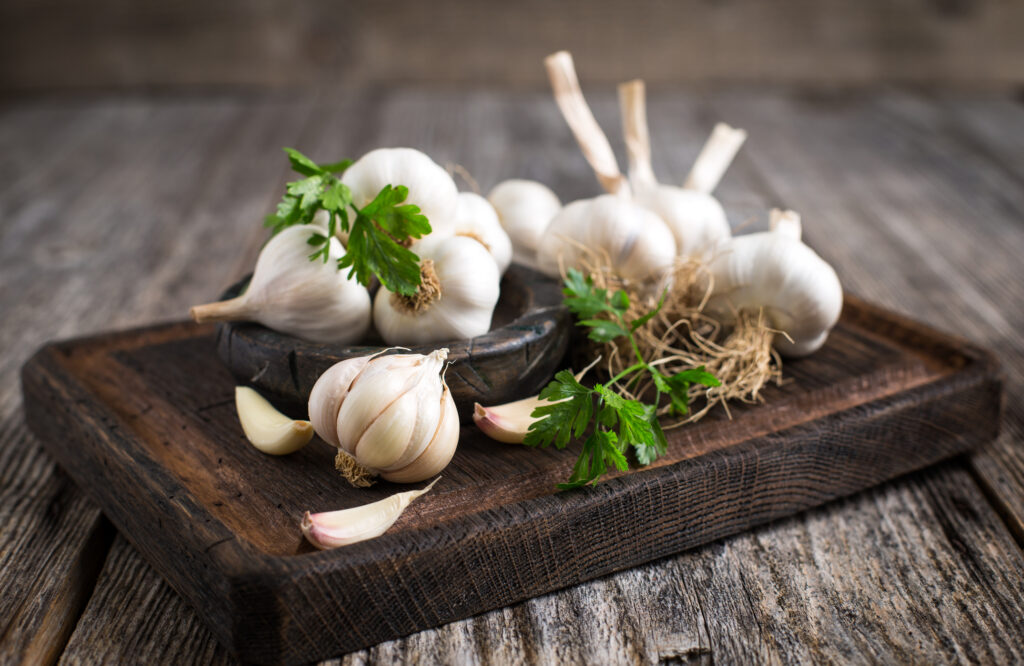
These days everyone claims to have the best immune system supplement. In this post, we review some of the science behind why you should look to these ingredients for immune support: Vitamin A, C, E, Selenium, Zinc, and Garlic.
Beta-carotene (Vitamin A)
Beta-carotene is considered an antioxidant and is a major component of the body’s natural defense against free radicals, as well as a source of vitamin A. This compound helps maintain healthy skin and also plays a vital role in eye health.
Vitamin A is important for maintaining mucosal integrity, which is the first line of immune defense. Vitamin A also stimulates the production and activity of white blood cells and regulates cell growth and division.
Research has demonstrated that vitamin A deficiency decreases the body’s resistance to foreign pathogens, reducing innate immune function. “VitA has both promoting and regulatory roles in both the innate immune system and adaptive immunity; therefore, it can enhance the organism’s immune function and provide an enhanced defense against multiple infectious diseases” (Huang et al, 2018).
Vitamin C

Vitamin C is a potent antioxidant with increasingly diverse uses in health promotion and disease prevention. While often taken for granted, vitamin C is becoming increasingly important for improving immune function, cardiovascular health, and avoiding degenerative diseases.
Vitamin C is essential because the human body cannot synthesize it. Vitamin C is water soluble and needs to be constantly replenished. During stressful events, such as dieting and exercise, plasma vitamin C levels decrease.
Vitamin C is the fuel that drive the activity of immune cells. This is why it is especially important to increase vitamin C intake during illness. Vitamin C deficiency has been associated with an increased frequency and duration of colds. A deficiency of vitamin C broadly affects the various key aspects of immune function, including the production of antibodies that fight known infections. As a result of vitamin C’s wide-ranging impact on the immune system, a deficiency could leave us vulnerable to infections. A weakened immune system caused by low vitamin C levels can make any infection more serious.
The benefits of Vitamin C are not limited to the immune system. Adults with higher vitamin C levels exhibit lower weight, BMI, and waist circumference, and better measures of metabolic health, including lower HbA1c, insulin, and triglycerides, all risk factors for type 2 diabetes. A 2015 study involving obese patients with high blood pressure and/or diabetes showed that daily doses of vitamin C resulted in reductions of inflammation, serum glucose levels, and triglyceride levels.
As an antioxidant, vitamin C can protect against damage done by oxidative stress. Regular exercise is an important part of a healthy lifestyle. However, the increased delivery of oxygen-rich blood during exercise is a source of destructive free radicals which are associated with muscle soreness and post-exercise recovery.
In a mouse model of vitamin C deficiency and premature aging, a higher dose of supplemental vitamin C (equivalent to about 1300 mg per day in a 175 lb person) was compared with a lower dose (equivalent to about 130 mg per day in a 175 lb person). After one year, mice receiving the higher dose of vitamin C exhibited greater immune cell counts than mice receiving the lower dose (Uchio 2015).
Results from a large analysis of placebo-controlled trials indicate vitamin C supplementation reduces the duration of colds, with an 8% reduction in adults and a 14% reduction in children. In addition, the analysis found vitamin C supplements reduced the incidence of colds by half in people undergoing extreme physical exertion, such as marathon runners (Hemila 2013).
Vitamin C plays an important role in the creation of white blood cells, enabling your immune system to function optimally, and improves immune response by increasing levels of interferons – warning signals that trigger immune mechanisms. Studies have found that vitamin C can reduce the duration of colds while a lack of vitamin C can make you more prone to getting sick.
Vitamin E
Vitamin E is a fat-soluble antioxidant that stops the production of free radicals formed by fat oxidation. Numerous studies have demonstrated the benefits of vitamin E for cardiovascular, immune function, DNA repair, and protection against free radicals. Scientists are investigating whether vitamin E might help prevent or delay the chronic diseases associated with free radicals by limiting free-radical production and possibly through other mechanisms.
A variety of animal studies have shown vitamin E deficiency can trigger immune suppression. Meanwhile, clinical evidence has shown vitamin E supplementation can increase resistance to infection, especially in older individuals (Wu 2014; Wu 2008; Han 2006).
In a study in elderly men and women, supplementation with 200 mg per day vitamin E significantly enhanced immune parameters including neutrophil, T-cell, B-cell, and NK-cell function, bringing their values close to those of younger healthy adults (De la Fuente 2008).
Increased vitamin E intake has been shown to restore the decline in T-cell function associated with aging. This improvement in T-cell function results from vitamin E’s direct impact on T cells as well as inhibition of prostaglandin E2, a mediator of inflammation and a T-cell suppressor (Wu 2014; Wu 2008; Han 2006). In a mouse model, vitamin E supplementation reversed the age-associated decline in naïve T-cell function (Adolfsson 2001).
Vitamin E is a powerful antioxidant that helps the body fight off infection and is important for maintaining T-cell membrane integrity
Garlic

The therapeutic use of garlic dates back over 5000 years. Garlic has strong antiviral effects and can support healthy immune function. Studies have shown that garlic reduces the risk of becoming sick in the first place, as well as how long you stay sick. Garlic contains a compound called allicin, which is quickly converted into compounds which have been shown to boost the response of white blood cells in the body when they encounter viruses, such as the viruses that cause the common cold or flu.
Studies have demonstrated garlic’s effectiveness in reducing oxidative stress in animals with high blood lipid levels. Supplementation with garlic significantly countered the lipid-related depletion of intracellular antioxidants in the liver and blood. A separate 6-month human study found that garlic notably lowered levels of the oxidative marker malondialdehyde in plasma and red blood cells.
A detailed review of data from published clinical trials found garlic supplements significantly reduce the number, duration, and severity of upper respiratory tract infections. This review also found garlic supplements stimulate immune function by increasing macrophage activity, numbers of NK cells, and production of T and B cells (Ried 2016). In a clinical trial, 120 healthy participants, 21–50 years old, were assigned to use 2.56 g aged garlic extract or placebo daily for 90 days during cold and flu season. Garlic supplementation was associated with reduced cold and flu severity, as well as increased cytotoxic T-cell and NK-cell proliferation and activity (Percival 2016). In animal research, garlic has been shown to increase antibody production and enhance the cell-killing activity of macrophages, cytotoxic T cells, and NK cells (Ghazanfari 2000). Other animal research suggests aged garlic extract may prevent immune suppression associated with psychological stress (Kyo 1999).
One study gave 146 healthy volunteers either garlic supplements or a placebo for three months. The garlic group had a 63% lower risk of getting a cold, and their colds were also 70% shorter. Another study found that colds were on average 61% shorter for subjects who ate 2.56 grams of aged garlic extract per day, compared to a placebo group. Their colds were also less severe
Garlic has also been demonstrated to suppress the overactive immune response associated with allergic reactions. Data from experimental studies indicate aged garlic extract may reduce histamine release and modify the function of immune cells involved in allergic reactions (Kyo 2001).
Zinc
Zinc is an essential trace mineral that is critical to healthy immune function. Zinc can be effective in warding off the common cold because it binds to the same cell receptor sites, preventing viruses from binding to them. In other words, zinc can prevent viruses from entering the cell, which helps stop viruses from replicating.
Zinc deficiency is common in older individuals, and may lead to negative changes in immune function including diminished thymus function, decreased antibody response to vaccines, and impaired function of phagocytic and NK cells (Haase 2009; Cabrera 2015). In a study in healthy older volunteers, daily intake of 45 mg zinc for one year resulted in a 67% reduction versus placebo in incidence of infections (Prasad 2007). In a study of individuals in nursing homes, residents with normal zinc levels had a significantly lower incidence of pneumonia compared with zinc-deficient individuals. Zinc-replete individuals also had shorter pneumonia duration and 50% lower usage of antibiotics, as well as lower all-cause mortality (Meydani 2007).
Selenium
Selenium is essential for many operations of a healthy immune system. “Selenium influences both the innate, “nonadaptive” and the acquired, “adaptive” immune systems” (Arthur et al, 2003). Thus, selenium deficiency impairs several components of the immune system response. A study which treated selenium-deficient mice with varying doses of selenium found a dose-dependent increase in the activity of neutrophils, a type of white blood cell which forms an essential part of the innate immune system (Arthur et al, 2003). “Overall, there is considerable evidence strengthening the notion that Se affects different types of immune responses in different ways” (Hoffmann, 2008).

